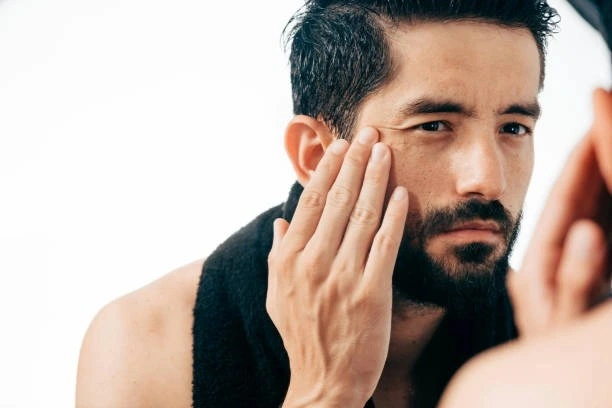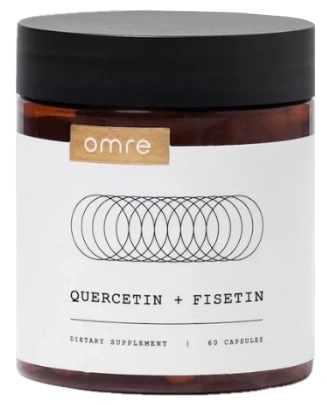Table of Contents
When it comes to skincare, nature offers some of the best solutions—and quercetin is no exception. This plant-based antioxidant is gaining attention for its ability to soothe, protect, and rejuvenate the skin.
Whether you’re battling redness, signs of aging, or dryness, quercetin might just be the secret ingredient your routine has been missing.
Let’s explore why this powerhouse is becoming a must-have in skincare.
Quercetin + Fisetin
Quercetin and Fisetin help manage 'zombie' senescent cell burden and support cellular rejuvenation.*
What is Quercetin?
 Quercetin is a natural antioxidant found in fruits, vegetables, and grains, known for its ability to combat oxidative stress and inflammation. These qualities make it a valuable ingredient for promoting skin health and reducing the visible signs of aging.
Quercetin is a natural antioxidant found in fruits, vegetables, and grains, known for its ability to combat oxidative stress and inflammation. These qualities make it a valuable ingredient for promoting skin health and reducing the visible signs of aging.
Quercetin belongs to a group of plant compounds called flavonoids, which are responsible for giving fruits and vegetables their vibrant colors.
You’ll find it in foods like apples, onions, berries, and even red wine. Beyond its striking pigmentation, quercetin plays a key role in protecting plants—and humans—from environmental stressors.
In skincare, quercetin works much like a shield. Its antioxidant properties help neutralize free radicals that damage skin cells over time.
At the same time, its anti-inflammatory abilities reduce redness and irritation, making it a soothing choice for sensitive or reactive skin types.
Is Quercetin Good for Skin?
Yes, quercetin is good for your skin! Its antioxidant, anti-inflammatory, and antiallergic properties can reduce inflammation, prevent signs of aging, and support hydration and skin healing.
Before we dive into its benefits, it's important to note that while quercetin shows great potential, much of the evidence comes from preliminary studies, and further research is needed to confirm these benefits. Always consult with a healthcare professional or dermatologist when considering new supplements or ingredients for your skincare routine.
Quercetin’s benefits for the skin are impressive, thanks to its ability to address multiple concerns at once. Whether you’re dealing with irritation or dryness, this ingredient can offer relief. Here’s how:
Reduces Inflammation: A study showed that quercetin can help soothe redness, itching, and irritation caused by UV exposure and histamine reactions, thanks to its anti-inflammatory properties (1).
Protects Against Skin Aging: Research suggests that quercetin's antioxidant properties may help fight oxidative stress, which contributes to wrinkles and other signs of aging caused by environmental damage (2).
Supports Skin Regeneration: Studies indicate that quercetin may encourage collagen production and cell turnover, potentially aiding in wound healing and skin repair (3).
Improves Hydration: Preliminary findings suggest that quercetin may strengthen the skin’s barrier, helping to lock in moisture and maintain supple skin (4).
These multitasking benefits make quercetin a versatile addition to any skincare routine, whether you’re aiming for hydration, protection, or repair.
The Science Behind Quercetin’s Skin Benefits
Quercetin’s impact on skin health isn’t just a buzzword; it’s backed by emerging research. Studies show that this antioxidant can do much more than protect your skin—it can also help it recover.
For example, a test-tube study found that quercetin significantly reduced markers of inflammation, such as TNFα and IL-6, which are known contributors to redness and swelling (5). This makes it a promising option for calming irritated or sensitive skin.
When it comes to anti-aging, quercetin shines here too. Research suggests that it can help fight oxidative stress, which plays a major role in skin aging.
A study published in Oxidative Medicine and Cellular Longevity noted that quercetin could reduce the effects of UV-induced skin damage, including wrinkles and loss of elasticity (6, 7).
Its hydrating benefits are also worth noting. In animal studies, quercetin was shown to help restore the skin’s natural barrier, improving moisture retention and reducing water loss.
While these findings are promising, further research on humans is needed to fully understand its long-term benefits.
Whether you’re aiming to calm inflammation or slow down the clock on aging, quercetin’s multifunctional properties make it a standout ingredient worth considering for your skincare lineup.
Key Quercetin Benefits for Skin Health
Quercetin may offer several potential benefits for skin health, making it a versatile ingredient for addressing common concerns. Here are some of the most notable:
Reduces Inflammation: Quercetin’s potential anti-inflammatory properties might help soothe redness, irritation, and swelling linked to conditions like eczema, rosacea, or UV exposure. Some studies suggest that quercetin may inhibit inflammatory markers like TNFα and IL-6, which are associated with skin irritation.
Fights Signs of Aging: As a natural antioxidant, quercetin may help combat free radicals that contribute to wrinkles, fine lines, and reduced elasticity. Research indicates that it could reduce oxidative stress, a factor in premature aging, though more studies are needed.
Promotes Skin Regeneration: Quercetin might play a role in supporting the skin’s repair process by stimulating collagen production and improving cell turnover. While more research is required, early findings suggest it could aid in wound healing.
Improves Skin Hydration: Quercetin may help strengthen the skin barrier, potentially assisting in retaining moisture and keeping skin soft and hydrated. This barrier-supporting effect might also help reduce transepidermal water loss.
- Protects Against UV Damage: Quercetin could offer some protection against UV rays by neutralizing free radicals generated by sun exposure. Some studies have indicated that it may help minimize the effects of UV-induced skin damage, but further research is necessary to confirm these findings.
Other Potential Health Benefits of Quercetin
Beyond skincare, quercetin offers a range of potential health benefits. From reducing inflammation to protecting brain health, its antioxidant and anti-inflammatory properties are at the heart of its versatility.
There are several reported benefits in the scientific literature, many of which are based on small-scale animal and human studies. While these findings are promising, it is important to emphasize that any reported benefit requires further peer-reviewed, large-scale studies to confirm its effectiveness and safety for widespread use.
May Reduce Inflammation
 Quercetin might help calm inflammation by targeting key markers like TNFα and IL-6. Studies have found that it could be beneficial for conditions involving chronic inflammation, such as arthritis, although more research is needed to confirm its broader effects (8).
Quercetin might help calm inflammation by targeting key markers like TNFα and IL-6. Studies have found that it could be beneficial for conditions involving chronic inflammation, such as arthritis, although more research is needed to confirm its broader effects (8).
May Ease Allergy Symptoms
 Quercetin’s potential to block histamine production and inflammation-related enzymes suggests it could help manage allergy symptoms.
Quercetin’s potential to block histamine production and inflammation-related enzymes suggests it could help manage allergy symptoms.
Animal studies have shown it may reduce severe allergic reactions, but human trials are still limited, so it’s best viewed as a complementary option (9).
Quercetin + Fisetin
Quercetin and Fisetin help manage 'zombie' senescent cell burden and support cellular rejuvenation.*
May Protect Against Brain Disorders
 Studies in mice indicate that quercetin might help protect against cognitive decline linked to aging. Studies in mice with Alzheimer’s disease suggest it may improve memory and reduce disease markers; however, there are no studies in humans at the time of writing to confirm its impact (10).
Studies in mice indicate that quercetin might help protect against cognitive decline linked to aging. Studies in mice with Alzheimer’s disease suggest it may improve memory and reduce disease markers; however, there are no studies in humans at the time of writing to confirm its impact (10).
May Support Healthy Blood Pressure
 Quercetin could support heart health by relaxing blood vessels and reducing blood pressure.
Quercetin could support heart health by relaxing blood vessels and reducing blood pressure.
Animal studies and human trials have reported improvements with doses of 500 mg or more daily, but consulting a healthcare provider is advised before use (12).
May Help Combat Aging
 Quercetin might play a role in managing aging by targeting senescent cells, sometimes referred to as "zombie cells." Test-tube and animal studies suggest it may help rejuvenate tissues and reduce markers of aging, though human research is still limited (13).
Quercetin might play a role in managing aging by targeting senescent cells, sometimes referred to as "zombie cells." Test-tube and animal studies suggest it may help rejuvenate tissues and reduce markers of aging, though human research is still limited (13).
Safety and Side Effects of Quercetin for Skin
Quercetin is generally safe for most people when consumed in food or as a supplement, but high doses—over 1,000 mg per day—may cause mild side effects like headaches or stomach discomfort. (14)
As a natural compound found in fruits and vegetables, quercetin is widely considered safe when included in your diet. It’s even suitable for pregnant and breastfeeding women when consumed through food sources.
Supplements are another way to incorporate quercetin, and they’re typically well-tolerated.
However, taking high doses (above 1,000 mg daily) could lead to mild side effects such as nausea, tingling sensations, or stomach aches.
If you’re considering quercetin supplements, it’s always a good idea to consult a healthcare provider, especially if you’re on medication.
How to Incorporate Quercetin into Your Skincare Routine
Adding quercetin to your routine is easier than you might think. From dietary changes to specialized supplements, there are several ways to enjoy its benefits:
Eat Quercetin-Rich Foods: Include onions, apples, berries, kale, and red grapes in your meals. These foods not only enhance skin health but also offer general wellness benefits.
Use Topical Products: Look for serums and creams with quercetin as an active ingredient. These can target specific skin concerns like redness, aging, or irritation.
Try Quercetin Supplements: A good-quality supplement can provide a more concentrated dose of this antioxidant to support your skin from the inside out.
When it comes to supplements, Omre Quercetin + Fisetin stands out as a high-quality choice. It combines quercetin with fisetin, another powerful antioxidant, to help your body eliminate 'zombie' senescent cells—those damaged cells that can contribute to aging and inflammation.
What sets Omre Quercetin + Fisetin apart is its premium formulation. With 98% pure fisetin and ultra-absorbable quercetin phytosome, it’s designed for maximum impact. Each serving delivers 500 mg of quercetin and 100 mg of fisetin without fillers or additives.
Manufactured in a GMP and FDA-registered facility in the USA, this supplement provides exceptional quality and purity.
Conclusion
Quercetin is a natural multitasker when it comes to skin health. Its anti-inflammatory and antioxidant properties may help reduce redness, support skin regeneration, and protect against signs of aging.
Plus, its versatility extends to other potential health benefits, including reducing inflammation and supporting brain and heart health.
If you’re looking for a convenient and effective way to incorporate quercetin into your routine, Omre Quercetin + Fisetin offers a top-tier option with scientifically-backed benefits.
Its pure and absorbable formula ensures maximum effectiveness for your skin and overall well-being.  Curious to try it? Check availability today!
Curious to try it? Check availability today!
FAQs
Can quercetin be used on sensitive skin?
Yes, quercetin is known for its anti-inflammatory properties, which may help calm redness and irritation, making it suitable for sensitive skin. However, it’s always wise to patch test any new product before applying it to your face.
Is quercetin better consumed through food or supplements for skin benefits?
Both options have their benefits. Eating quercetin-rich foods like berries and onions supports overall health, while supplements provide a more concentrated dose, which may enhance its skin benefits.
Can quercetin replace sunscreen for UV protection?
No, quercetin should not replace sunscreen. While it offers some photoprotective properties, it works best as an added layer of protection against UV damage, not as a standalone solution.
How long does it take to see skin benefits from quercetin?
Results can vary depending on how it’s used. Dietary sources and supplements may take weeks to months to show noticeable effects, while topical products could offer quicker, targeted benefits.
Are there any medications that interact with quercetin supplements?
Yes, quercetin may interact with certain medications, such as antibiotics and blood pressure drugs. Consult your doctor if you’re taking medication and considering quercetin supplements.





